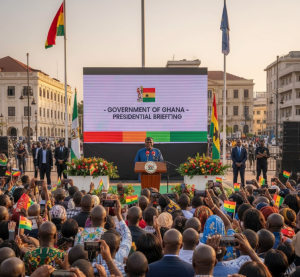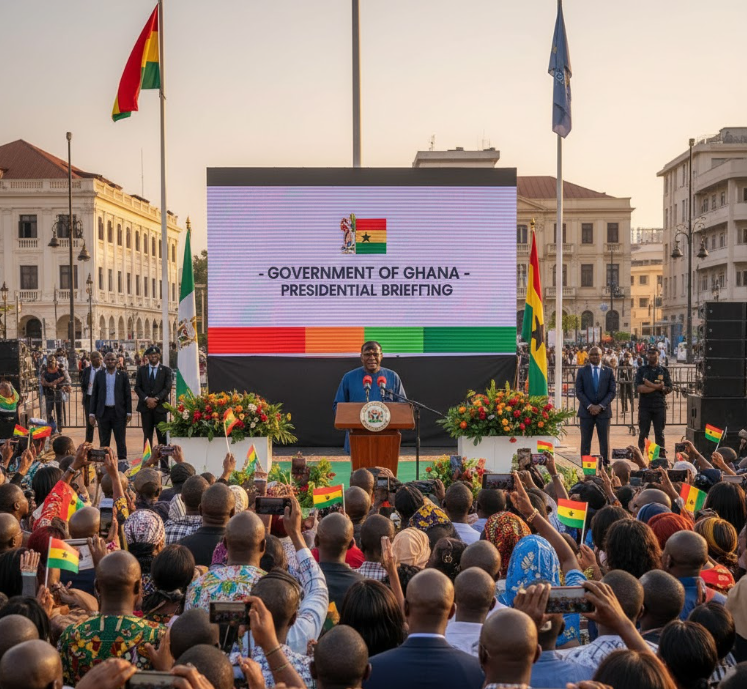If you’ve been scrolling through your phone trying to catch up on what’s happening in Ghana lately, you’re not alone. Between work, family, and the daily hustle, keeping tabs on the most important recent general news stories in Ghana can feel like a full-time job. But here’s the thing: staying informed isn’t just about being the smartest person in the room at your next family gathering (though that’s a nice bonus). It’s about understanding the changes shaping our nation and how they might affect your daily life.
I remember chatting with a friend at the market last week who had no idea about some major policy shifts that could directly impact her small business. That conversation made me realize how easy it is to miss crucial updates in our fast-paced world. So, I’ve done the heavy lifting for you, compiling the top 10 recent general news stories in Ghana that you absolutely need to know about right now.
From political developments to educational reforms and economic updates, these stories are painting the picture of where Ghana is heading in 2025. Let’s dive in.
1. President Mahama’s Strategic Return and Government Reforms
President John Dramani Mahama made headlines with his inauguration on January 20, 2025, marking his return to Ghana’s highest office. But this isn’t just about political pageantry. The President has committed to religious tolerance, peaceful coexistence, and renewed strategic partnerships with international organizations. His administration has already begun implementing several high-impact reforms that are turning heads.
One of the most talked-about moves? President Mahama ordered an audit of all state lands leased between 2017 and 2024 and lifted the ban on state land sales after implementing reforms. This bold step aims to address transparency concerns and streamline land management, something that affects developers, investors, and ordinary Ghanaians looking to secure property.
What does this mean for you? If you’ve been considering investing in land or you’re involved in real estate, these reforms could reshape the landscape (literally) of property acquisition in Ghana.
2. Judicial Shake-Up: The Removal of Chief Justice Torkornoo
Talk about a bombshell that got everyone from Accra to Tamale debating! Chief Justice Gertrude Torkornoo was removed from office, sparking intense reactions from various personalities and raising questions about judicial independence. The move has been described by some as controversial, with critics calling it a potential threat to Ghana’s democratic institutions.
Former Chief Justice Sophia Akuffo criticized the handling of the case, comparing it to a treason trial. Meanwhile, legal experts and political commentators have weighed in from all sides, with some supporting the move as necessary accountability and others warning about setting dangerous precedents.
This story matters because the judiciary is the backbone of our democracy. Any changes here ripple through everything from business contracts to human rights protections. Whether you’re signing a lease or resolving a dispute, the strength and independence of our courts affect us all.
3. Ghana’s Economic Outlook: World Bank and IMF Assessments
Let’s talk money, because at the end of the day, economic stability touches every pocket in Ghana. The World Bank’s latest Public Finance Review revealed that Ghana’s impressive GDP growth of 6.8% annually from 2008 to 2019 was driven by oil production and debt accumulation, making the country vulnerable to global shocks.
Here’s where it gets interesting: Ghana’s recent debt crisis stemmed from weak expenditure controls, inefficient public spending, underperforming revenue collection, and costly borrowing. But there’s a silver lining. The report suggests that with the right structural reforms, Ghana can build a more resilient fiscal system.
Additionally, the IMF conducted a mission in February 2025, engaging authorities on macroeconomic developments and policies for the 2025 budget, with a formal assessment expected in April 2025.
What’s the takeaway? If you’re a business owner or just trying to make your salary stretch further, understanding these economic currents helps you make smarter financial decisions. Those cedi fluctuations and inflation rates? They’re connected to these bigger fiscal policies.
4. Education Sector Developments: Supporting Ghana’s Students
Education is where nations invest in their future, and Ghana has been making some significant moves here. The Ghana Education Service distributed 6,607,095 sanitary pads to schoolgirls across all 16 regions as part of efforts to mark the 2025 International Day of the Girl Child. This might seem like a small thing to some, but for thousands of girls who miss school during their periods, it’s absolutely transformative.
There’s also buzz around university rankings. The University of Cape Coast consolidated its position as the top-ranked university in both Ghana and West Africa in the 2026 Times Higher Education rankings, while the University of Ghana achieved major success in key areas of research environment.
Why should you care? Better universities mean better-educated graduates, which means a more competitive workforce and a stronger economy. If you have kids or are planning your own educational path, knowing which institutions are rising helps you make informed choices.
5. Agricultural Boost: Cocoa Price Increase for Farmers
Ghana and cocoa are practically synonymous, so any news about cocoa pricing sends ripples through the entire economy. The Minister of Finance announced a new farmgate price of GH¢3,625 per 64kg bag of cocoa, representing a GH¢400 increase and a 12.27% rise, which took effect from October 3.
The President of the Ghana National Association of Cocoa Farmers welcomed the increase, describing it as a long-awaited response showing the administration was listening. This is huge for farming communities who’ve been struggling with rising costs and demanding better compensation for their labor.
Think cocoa doesn’t affect you if you’re not a farmer? Think again. Ghana’s cocoa exports impact our foreign exchange reserves, which affects everything from the price of imported goods to the strength of the cedi in your pocket.
6. Digital Innovation Takes Center Stage
Ghana is making serious moves in the tech and innovation space. The Ghana Digital and Innovation Week 2025 commenced under the theme “Catalysing Change: Innovation and Digital Transformation at the Centre of Ghana’s Development Agenda,” featuring regional editions across Takoradi, Koforidua, Techiman, Wa, Kumasi, and Tamale.
The event showcases local innovators developing practical solutions to real-world challenges including agritech, climate-smart innovations, digital trade, and youth entrepreneurship. This isn’t just tech talk for the elite. These innovations are creating apps that help farmers, platforms that connect buyers and sellers, and solutions that make daily life easier for ordinary Ghanaians.
The grand finale is scheduled from November 12-14, 2025, in Accra. If you’re an aspiring entrepreneur or just curious about where Ghana’s innovation ecosystem is heading, this is your window into the future.

7. Health Sector Updates: HPV Vaccine Introduction
Healthcare news doesn’t always grab headlines, but this one deserves your attention. Ghana is set to introduce the Human Papillomavirus (HPV) vaccine into its routine immunization program in October 2025, with health authorities prioritizing accurate reporting to ensure no eligible girl is left behind.
Why does this matter? HPV is linked to cervical cancer, one of the leading cancer killers among women. By introducing this vaccine, Ghana is taking a proactive step in preventing a disease that has devastated too many families. If you have daughters, sisters, or nieces, this vaccine could literally save their lives down the road.
The rollout also highlights how Ghana is strengthening its healthcare infrastructure and preventive care systems, something we all benefit from whether we realize it or not.
8. Security and Crime: Addressing National Concerns
Safety is something we all think about, whether it’s walking home at night or running a business. Recent security developments have been making waves. Two men were arrested at Obuasi in the Ashanti Region in connection with the robbery and killing of a 20-year-old man, Kofi Mensah, at Tweapease-Aboo.
Additionally, there have been discussions about transnational organized crime. A delegation from the Malawi Defence Force Senior Command and Staff College undertook a study tour of Ghana’s Ministry of Defence to gain insights into Ghana’s strategic approach to combating transnational organized crime and enhancing regional security.
These stories remind us that while Ghana is generally peaceful, we can’t take security for granted. The government and security agencies are actively working to keep it that way, but community vigilance and cooperation remain essential.
9. Cultural Heritage: Kente Receives Geographical Indication Status
Here’s some news that made Ghanaians proud across the globe. Kente, Ghana’s iconic handwoven cloth, has been granted Geographical Indication status. If you’re wondering why that’s a big deal, let me break it down.
Geographical Indication status is like a copyright for cultural products. It means that only Kente cloth produced in Ghana using traditional methods can be called “Ghana Kente.” This protects our weavers from cheap imitations and ensures that when someone buys Kente, they’re getting the authentic article.
For the artisans in Bonwire, Adanwomase, and other weaving communities, this is validation of their craft and a shield against exploitation. For Ghana as a nation, it’s another way we’re protecting and monetizing our rich cultural heritage.
10. Transportation and Infrastructure: Vehicle Registration Reforms
Last but definitely not least, let’s talk about something that affects anyone who owns or wants to own a vehicle in Ghana. Ghana recorded 149,440 vehicle registrations between January and July 2025, showing that despite economic challenges, Ghanaians are still investing in personal transportation.
There’s also news about planned reforms to the vehicle registration system that will require more comprehensive documentation. While details are still emerging, the goal is to streamline processes, reduce fraud, and make it easier to track vehicle ownership for security purposes.
If you’re in the market for a car or dealing with registration issues, keep your eyes peeled for these updates. They could affect everything from how long it takes to get your documents to what paperwork you’ll need to provide.
Key Developments Comparison
| Sector | Major Development | Impact Level |
|---|---|---|
| Politics | Presidential reforms and judicial changes | High |
| Economy | World Bank assessment and IMF engagement | High |
| Education | Sanitary pad distribution and university rankings | Medium-High |
| Agriculture | Cocoa price increase | High |
| Technology | Digital Innovation Week 2025 | Medium |
| Health | HPV vaccine introduction | High |
| Security | Crime arrests and regional cooperation | Medium |
| Culture | Kente Geographical Indication status | Medium |
| Transportation | Vehicle registration statistics | Medium |
| Land Reform | State land audit and sale reforms | High |
Wrapping It All Up
So there you have it: the top 10 recent general news stories in Ghana that are shaping our nation’s trajectory in 2025. From President Mahama’s return and controversial judicial changes to economic assessments, educational initiatives, and cultural victories, these stories paint a picture of a country in transition.
Ghana is at a crossroads where we’re balancing tradition with innovation, confronting challenges while celebrating achievements, and working to build a more transparent, prosperous, and equitable society. Whether you’re a business owner, a parent, a student, or just a concerned citizen, these developments will likely touch your life in ways both big and small.
The question is: what will you do with this information? Will you join conversations about these issues? Will you hold leaders accountable? Will you support local innovations or advocate for better policies?
What recent news story surprised you the most? Drop a comment below and let’s discuss how these changes are affecting your community. And if you found this roundup helpful, share it with someone who needs to catch up on Ghana’s latest developments.
Frequently Asked Questions About Recent Ghana News
What are the most important political changes in Ghana in 2025?
The most significant political developments include President Mahama’s return to office in January 2025, the removal of Chief Justice Gertrude Torkornoo (which sparked national debate about judicial independence), and comprehensive land reforms including audits of state lands leased between 2017 and 2024. These changes are reshaping governance structures and accountability mechanisms across the country.
How is Ghana’s economy performing according to international organizations?
According to the World Bank’s latest Public Finance Review, Ghana experienced strong GDP growth of 6.8% annually from 2008 to 2019, but this growth was largely fueled by oil production and debt accumulation. The country recently faced a debt crisis due to weak expenditure controls and inefficient public spending. However, with structural reforms and fiscal consolidation efforts, international organizations believe Ghana can build a more resilient economic foundation. The IMF is actively engaged with Ghana on policy development for the 2025 budget.
What new healthcare initiatives are being introduced in Ghana?
Ghana is introducing the Human Papillomavirus (HPV) vaccine into its routine immunization program in October 2025. This preventive measure aims to protect girls from cervical cancer, a leading cancer killer among women. Health authorities are prioritizing accurate information and comprehensive outreach to ensure every eligible girl receives the vaccine, demonstrating Ghana’s commitment to preventive healthcare.
How is Ghana supporting digital innovation and entrepreneurship?
Ghana launched the Digital and Innovation Week 2025 with regional editions across major cities including Takoradi, Koforidua, Techiman, Wa, Kumasi, and Tamale. The initiative, themed “Catalysing Change: Innovation and Digital Transformation at the Centre of Ghana’s Development Agenda,” showcases local innovators developing solutions in agritech, climate-smart innovations, digital trade, and youth entrepreneurship. The grand finale in Accra from November 12-14, 2025, will bring together regional winners and international partners.
Why is the Kente Geographical Indication status important for Ghana?
The Geographical Indication status granted to Kente protects Ghana’s iconic handwoven cloth from imitation and ensures only authentic Kente produced in Ghana using traditional methods can carry the Ghana Kente designation. This protects local weavers from cheap knockoffs, preserves traditional craftsmanship, and helps Ghana monetize its cultural heritage while maintaining quality standards. It’s a significant victory for artisans in weaving communities like Bonwire and Adanwomase.
Sources:
- Ghana News Agency – Providing daily updates on national developments
- GhanaWeb – Comprehensive coverage of political and social news
- World Bank Ghana Reports – Economic analysis and fiscal policy assessments
